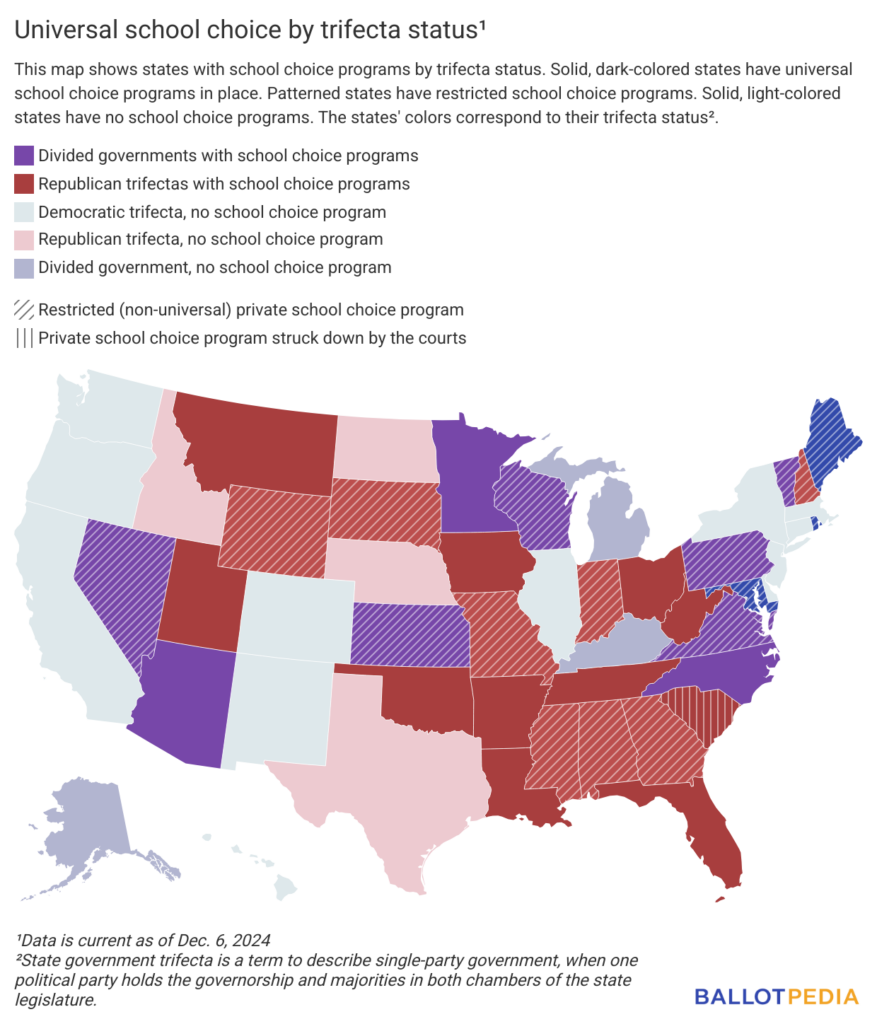Tennessee Gov. Bill Lee (R) signed the Education Freedom Act of 2025 (EFA) into law on Feb. 12, 2025.
The bill — House Bill 6004 — creates a universal private school student scholarship program under which all students are or will be eligible to receive the scholarship. Going into 2025, Tennessee had two existing education savings account (ESA) programs available to a limited number of students. One program was for certain low-income families in Hamilton County (Chattanooga), Shelby County (Memphis), and Metro Nashville Public Schools systems. The other was for students with certain disabilities. Students will not eligible to participate in both the universal scholarship program and either of the existing, limited ESA programs in the same year.
Vouchers, ESAs, and education tax credits are the three most common types of private school choice. To learn more about the differences between these programs, click here.
What does the bill do?
HB 6004 allows the Tennessee Department of Education — the agency administering the program — to award 20,000 scholarships in 2025 to students who are eligible to attend public school but are enrolled in a private school. The bill reserves half of the 2025 scholarships for students in families under a certain income threshold.
After 2025, the scholarships must be awarded with applicants prioritized based on the following factors:
- currently participating students,
- family income levels,
- students enrolled in public schools or entering kindergarten
- first-come, first-serve
The bill authorizes the department to increase the number of scholarships they award by 5,000 for any year starting in 2026 if the number of applicants in the previous year exceeded 75% of the number available.
In the 2025-2026 school year, the scholarship amount for each participating student will be $7,296. The scholarship amount is tied to the state's base formula — the Tennessee Investment in Students Achievement (TISA) formula — for per-student education funding, which means it will increase as the state's per-student education funding increases.
The bill requires students attending private schools with scholarship funding to take state exams, but "does not expand the regulatory authority of this state, the officers of this state, or the authority of any LEA to impose any additional rules, regulations, or requirements on private schools that enroll recipients beyond the rules narrowly tailored to enforce the requirements of the program," according to the text of the bill.
HB 6004 also provides for a one-time $2,000 bonus to each K-12 public school teacher in the state. It also provides that state funding to school districts does not decrease if enrollment decreases compared to the previous year.
Who supported and opposed the bill?
Gov. Lee convened a special legislative session on Jan. 27 to vote on the EFA, Hurricane Helene relief, and immigration policy. Lee said that he convened the special session, though the regular legislative session was underway, to expedite legislation for issues that matter to the state residents.
The EFA passed the Tennessee House of Representatives 54-44, with 53 Republicans and one Democrat in support. Twenty-one Republicans and 23 Democrats opposed it. It passed the Tennessee Senate 20-13, with 20 Republicans in support, and seven Republicans joining all six Democrats in opposition.
Republican legislators who voted against the EFA included Rep. Todd Warner and Rep. Jody Barrett. Both representatives said they didn't believe the bill was fiscally conservative.
Barrett said he believed the bill should have been part of the regular session so there was more time to consider and debate the bill. Debate time was divided to give 45 minutes to the 75 Tennessee House Republicans and 45 minutes to the 24 House Democrats for debate. Barrett said that two of the 21 Republicans who voted against the bill were given a total of four minutes to debate it on the House floor.
"It certainly didn’t give us enough time to go back and talk to our constituents as the bill was evolving and amendments were being filed," Barrett said.
Senator Rusty Crow (R) supported the bill, arguing that it was not the role of government to tell parents how to educate their children but instead to offer choices and leave it to the parents.
What is the background?
Tennessee is the 13th state to adopt a universal school choice policy. Ten of the 13 states, including Tennessee, with universal school choice policies have Republican trifectas, and the other three have divided governments. Of the divided governments with universal school choice, two have Democratic governors and Republican legislatures, while the other one has a Democratic governor and Senate and a Republican state House. No states with a democratic trifecta have universal school choice policies; some states with Democratic trifectas have limited school choice programs for which only some students are eligible.
Arguments surrounding private school choice legislation often incorporate claims about the impact of private school choice on rural school districts. Ballotpedia's Impact of school choice on rural school districts portal is a comprehensive resource with data and analysis, all of the key arguments, policy and reform details, case studies, commentary and real-world stories, and state-by-state comparisons.

Additional reading:



